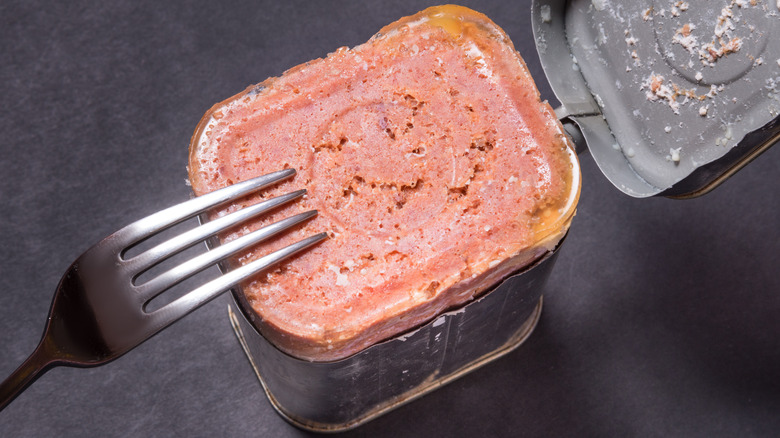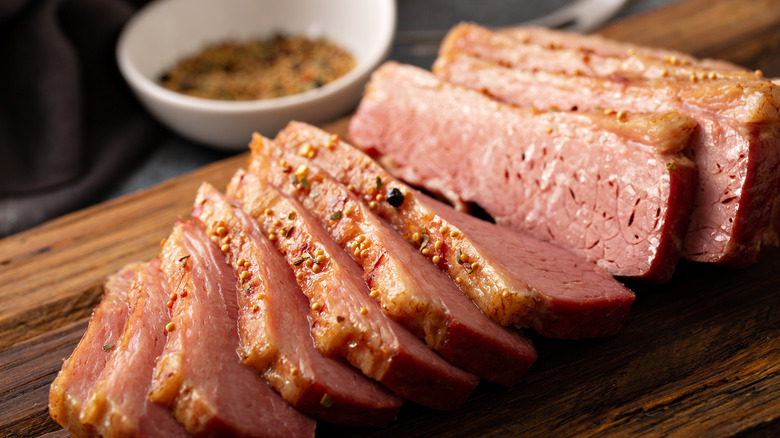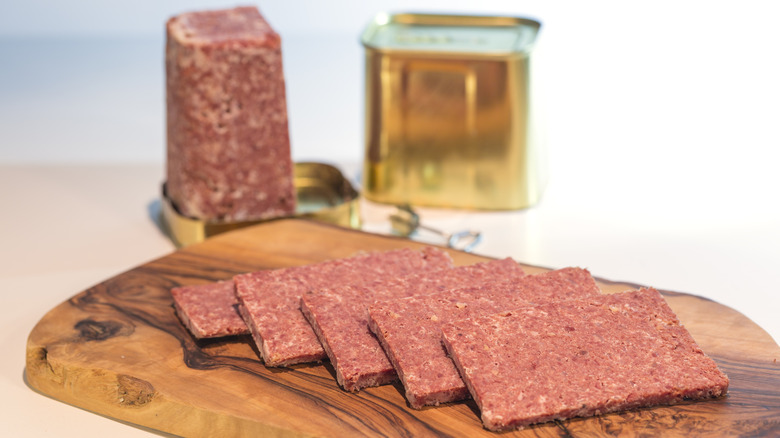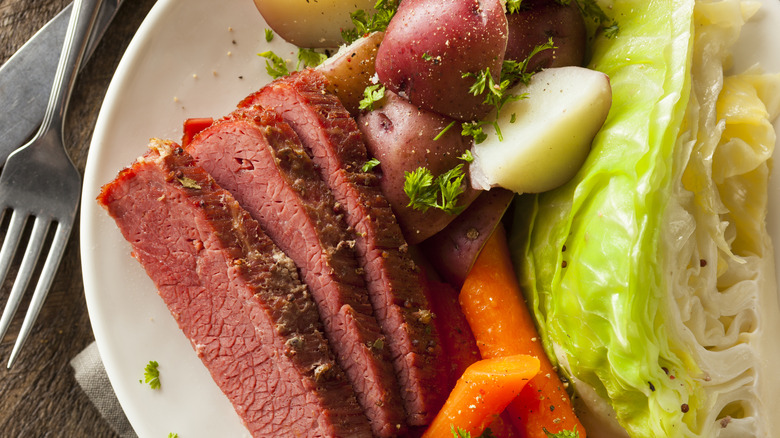What Type Of Meat Is Really In Canned Corned Beef?
Like many meat byproducts — think hot dogs, sausages, salami, and bologna – canned corned beef can get you wondering about what it is you're actually eating. Many of these products are made from a mixture of meats, like beef, pork, and turkey. However, the cuts of meat typically used are, well, a little less than savory.
According to the Food and Agriculture Organization, these meat byproducts can contain small amounts of fat, connective tissue, snouts, tongues, tripe, and giblets. In other words, if there are edible bits left of the animal after the preferred cuts have been removed, the leftover trimmings can be added to sausages and deli meats. That's probably something you didn't want to know about hot dogs.
Corned beef, unfortunately, isn't much different when it comes to the quality of its ingredients. But on a positive note, its ingredients make a lot more sense with historical context. Let's take a quick trip back to the 1800s, shall we?
Corned beef got its start as an Irish immigrant favorite
You may already associate corned beef with the Irish, but you may not know why this connection exists. According to Irish Central, beef wasn't exactly easy to get your hands on in 19th-century Ireland. However, upon their arrival in the United States, everything changed for Irish immigrants in America. Beef was more readily available, and the meats the Irish had grown accustomed to, such as ham, were more expensive.
Needless to say, immigrants were on the lookout for affordable food, and corned beef was the perfect contender. Not only was beef pretty much everywhere, but the cut of beef used for corned beef wasn't particularly desirable for other uses. Yes, we're talking about brisket, the cut of beef that used to be given away for free.
Per Kitchn, brisket can be divided into two categories — lean and fatty. The lean end is what usually goes into making corned beef, though as we've already alluded to, there are a few other ingredients involved. As much as we hate to ruin your appetite, let's just get this over with.
Corned beef doesn't contain actual corn
Despite the name, corned beef doesn't actually contain any corn. So where does the name come from? Per FoodHow, the process of turning brisket into corned beef involves bringing the meat with chunks — or "corns" — of salt.
The brining process tenderizes the brisket, as this cut is typically very tough and chewy, and gives it the soft texture we recognize as corned beef (via Delish). According to Food52, this particular brining process was popularized by the Jewish community, and today we associate corned beef just as much with them as we do with the Irish.
However, the production of corned beef and other cured meats usually involves the addition of nitrites, a preservative chemical compound that provides that pink color, prevents bacteria from growing, and helps cure meats faster. Sounds great, until you learn that nitrites are tied to a greater risk of developing cancer (per Reuters).
Now that we've covered corned beef's historical context and how it's made, there's only one thing left to look at, and that's the dirty details of what bits of beef actually go into making corned beef.
So what is canned corned beef, exactly?
Two words: prepare yourselves. Okay, so before we get around to the canned variety of corned beef, let's talk about the deli version of this Irish staple. As you might expect, deli corned beef is better quality (in terms of cuts of meat, anyway) than the canned stuff. It's just cured brisket. Simple enough.
However, when it comes to canned corned beef, things start to get a bit murky. While the product certainly does contain the lean end of the brisket, no one is apparently willing to say specifically what else is mixed in there. For instance, if you look up Hormel's canned corned beef on Innit, you'll see that the label simplifies the meat mix to merely "beef." And "beef," as hot dogs demonstrate (per Insider), can apply to just about every scrap of meat on a cow. Skin, feet, blood, you name it — if it's edible, it's probably going to be used for something. Sorry, but it's true.
At the end of the day, yeah, corned beef isn't for everyone, but so are a lot of other things that many people enjoy eating, like Cheez Whiz and Twinkies. The best we can do is make changes to our diet based on what we do or don't want to put into our bodies. Well, that or just continuing to eat corned beef without doing too much research into the ingredients.



